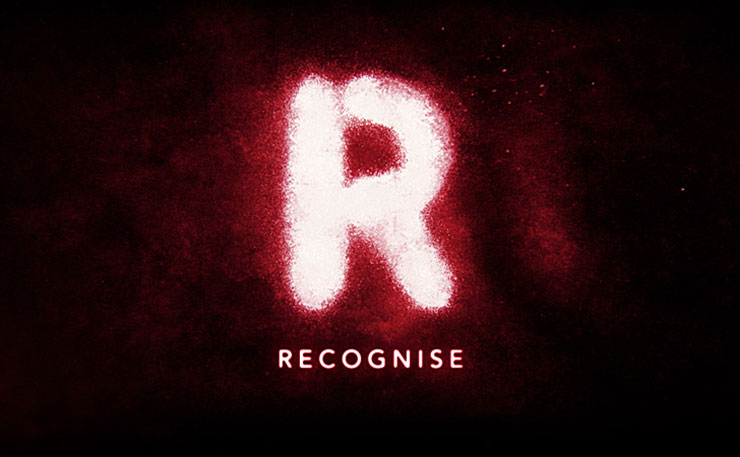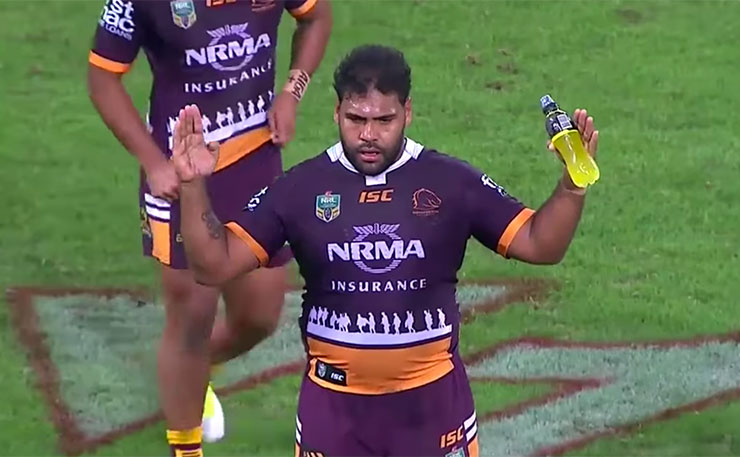Another week, another rugby league scandal. This one just happened to come while the NRL was trying to convince a nation it really cares about black issues, writes Amy McQuire.
Last week was the NRL’s annual Indigenous round. The various clubs transformed their jerseys for the weekend, adorning them with Aboriginal artwork and parading their black players out in front of the media spotlight to boost their ‘community’ credentials.
They also rebranded the week a round of ‘Recognition’ – in partnership with the government funded public relations campaign designed to sell the great con of constitutional reform (i.e. a fluffy preamble that does nothing to advance the rights of Aboriginal people).
This comes despite cynicism towards constitutional reform still keenly felt across the country, and a large portion of Aboriginal Australia instead calling for a treaty, in the lead-up to a final Referendum Council dialogue at Uluru (to be held next week).
Instead of inquiring about whether Aboriginal people agree with this farce, the NRL have instead bypassed black opinion and acted as if recognition is synonymous with substantial reform. There has been no talk about treaty or sovereignty, which has been repeatedly called for by mob. Perhaps that’s because there is no money in it, while the Recognise campaign is awash with government funding.
Recognition joint campaign director Mark Yettica-Paulson said that at every game last weekend, there would be “Recognise Field Leaders”, who are “aiming to have one million one-on-one conversations with everyday Australians and they’ll be recruiting volunteers to help them achieve that”.
“Thanks to the work of the NRL, on the footy field it’s simple – we recognise and acknowledge the unique contribution of Indigenous people to the game,” he said.

But this ‘unique contribution’ is only celebrated for First Nations people who are apolitical. And the platitudes are only applied to men.
In this year’s Indigenous round PR, I saw nothing about the contribution of women to the game – those who usually drive the success of the same minority who make a living from it. There was nothing on the mothers, aunties, sisters and grandparents, who are behind the scenes, working the canteens, driving kids to their practices sessions, keeping food on the table.
There was nothing on the fact that Aboriginal and Torres Strait Islander women are passionate about the game, and some of the biggest supporters. Instead, there was a focus on the individual, those talented minority who make it and want to be seen as ‘role models’ to their communities, regardless of whether they have earned it.
We have seen that players are less celebrated when they take a stand against racism – and we can take a case study in looking at how white Australia treated both Adam Goodes and Timana Tahu.
These racism scandals have made both the NRL and AFL sensitive to accusation – and so they put on these tokenistic ‘Indigenous’ rounds, and make deals with Recognise, despite knowing next to nothing about the issue. And while they do this, while they build smoke and mirrors around their supposed opposition to racism, the misogyny within its ranks is left unchallenged.
That was thrown into sharp focus recently, when one of the NRL’s most recognisable faces Sam Thaiday was called out by First Nations women across the country for his deeply racist and sexist remarks on The Footy Show.
In a segment where players from various teams were asked the question ‘who was your first crush’, Thaiday said: “I reckon Halle Berry was my first one. That’s when I, like, when I went through my jungle fever phase of liking dark girls there for a while. Then I figured out if it ain’t white it ain’t right”.
Black women were understandably outraged, that Aboriginal women are treated as disposable objects to be thrown away with the wind, and to be used as some type of novelty. The imagery of ‘jungle fever’ also conjured ideas that we were ‘savages’.
But although finding some occasional support amongst the brothers, there were also calls from black and white men alike, who claimed it was ‘just a joke’, and to ‘stick to the real issues’.
First of all, jokes are meant to be funny, and despite all his embarrassing attempts, Thaiday is definitely no Dave Chappelle. And second of all, for Aboriginal women, this is a real issue. This was not about feeling adequate enough for the desires of black men – the outrage was instead about the continual devaluing of Aboriginal women in society, which has festered on the frontier and continued into the present day.
The subjugation of black women was used to justify the theft of land, and the ongoing colonial project, and it still exists today. The term ‘white is right’ fits right in with this historical legacy, and to see it perpetrated by a prominent black man, was extremely hurtful to many.
The outrage also stemmed from the fact Aboriginal women are expected to support everyone else, including our men, and very rarely receive it back in turn. Meanwhile, many wondered about the message Thaiday was sending to our young women, including to his own daughters, about the way black women should be treated in an already deeply racist and misogynistic society.
Colonialism impacts women and men differently, and yet these differences are erased, and our women are rendered invisible. While First Nations women have rallied around Aboriginal men who have been the target of atrocious racism, for example again – Goodes, and Tahu – as well as the recent Bill Leak cartoon that prompted #IndigenousDads, when we feel victimised – we are told to sit down, be quiet, and stick to the ‘real issues’.
It’s a sad situation where Aboriginal people are stuck either reacting to the continual rubbish regurgitated by liberal feminists who are ‘intersectional’ by name only, and the fear that speaking out against misogyny within our own communities can lead to greater harm for not only men, but also women and children (taking the NT intervention as an example).
Although there are many black men who have stood up in support of our women, there have also been many who have told us to shut up and move on, so they can get back to watching a raging misogynist, and supposed ‘role model’ on a field while promoting the government lie that is Recognise.
Meanwhile, the women who have helped him and many other black athletes get there, who have supported them along the way, are silenced by the thud of their boots against leather.
Thaiday has not shown remorse despite being stripped of his role as ‘Deadly Choices’ ambassador. Given the fact NRL is a big business, and will squeeze as many dollars from their black players as long as they are fit and still playing, I wonder who he thinks will be supporting him once the fountain dries up?
Also see sister Natalie Cromb’s excellent piece on IndigenousX here.
Donate To New Matilda
New Matilda is a small, independent media outlet. We survive through reader contributions, and never losing a lawsuit. If you got something from this article, giving something back helps us to continue speaking truth to power. Every little bit counts.






